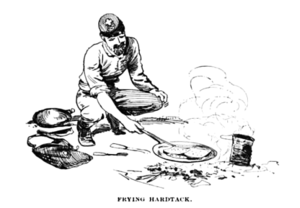Hard Tack Come Again No More
"Hard Tack, Come Again No More" is an American Civil War-era parody of the song "Hard Times, Come Again No More." First called "Hard Crackers, Come Again No More!", it is a sarcastic complaint about the quality of some of the provisions provided by military contractors.[2] The authors of the many verses of the parody are unknown, although the first version is often attributed to Josiah Fowler of the First Iowa Infantry dating to just after the Battle of Boonville, June 1861.[3]

Lyrics
Let us close our game of poker, take our tin cups in our hand
As we all stand by the cook's tent door
As dried mummies of hard crackers are handed to each man.
O, hard tack, come again no more!
CHORUS:
'Tis the song, the sigh of the hungry:
"Hard tack, hard tack, come again no more."
Many days have you lingered upon our stomachs sore.
O, hard tack, come again no more!
'Tis a hungry, thirsty soldier who wears his life away
In torn clothes—his better days are o'er.
And he's sighing now for whiskey in a voice as dry as hay,
"O, hard tack, come again no more!"
— CHORUS
'Tis the wail that is heard in camp both night and day,
'Tis the murmur that's mingled with each snore.
'Tis the sighing of the soul for spring chickens far away,
"O, hard tack, come again no more!"
— CHORUS
But to all these cries and murmurs, there comes a sudden hush
As frail forms are fainting by the door,
For they feed us now on horse feed that the cooks call mush!
O, hard tack, come again once more!
FINAL CHORUS
'Tis the dying wail of the starving:
"O, hard tack, hard tack, come again once more!"
You were old and very wormy, but we pass your failings o'er.
O, hard tack, come again once more!
Having to consume less appetizing food for extended periods led to revisions wishing for the return of hard tack.[4]
References
- Billings, Hardtack and Coffee, p. 117: "FRYING HARDTACK."
- Billings, Hardtack and Coffee, p. 118: "For some weeks before the battle of Wilson's Creek, Mo., where the lamented Lyon fell, the First Iowa Regiment had been supplied with a very poor quality of hard bread (they were not then (1861) called hardtack)."
- Ware, The Lyon Campaign in Missouri, p. 218: "A man in Co. 'C' named Fowler wrote a verse shortly after we left Boonville and it was considerably sung, and finally ran into many verses, on 'Hard Tack come again no more.' I have only one verse; it ran as follows:
There's a lazy, hungry soldier and he lies around all day;
His clothes are torn, he better day are o'er;
He sighs for nice hot biscuits, and spring chickens far away,
Hard Tack come again no more.
It's the song and the sigh of the weary,
Hard tack, hard tack, come again again no more;
Long time have you lingered around the cook-tent door,
O Hard Tack come again no more." - Ware, The Lyon Campaign in Missouri, p. 218-219: "There were lots of other verses to it, but after we had been through 'Camp Mush' No. 1 and had got to 'Camp Mush' No. 2, Mr. Fowler changed the text and got up some new verses, of which I have retained only one, as follows:
In that latter sentiment we all joined, and we sang it lustily."It's the song and the sight of the hungry,
Hard Tack, Hard Tack, come again once more;
our were old and very wormy, but you're pie beside that mush,—
O Hard Tack, come again once more.
Bibliography
- Billings, John D. Hardtack and Coffee: Or, The Unwritten Story of Army Life. Boston: George M. Smith & Co. (1887).
- Ware, E.F. The Lyon Campaign in Missouri: Being a History of the First Iowa Infantry. Topeka, Kansas: Crane & Company (1907).